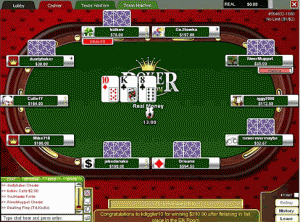Winning Strategies – Online Poker Tells
Online Poker Tells
In poker, tells are actions or gestures by players in reaction to a specific circumstance. These predominantly subconscious cues can result from a player trying to disguise the strength or weakness of their hand, because of insecurity or uncertainty, or simply because of base emotions like fear or anger. They can be interpreted by astute observers and used to gain an edge on an opponent. But reading such tells is a difficult skill to master, and because many players exhibit the same responses, the real trick is learning to distinguish the meanings of the actions and their implications—since the same responses do not always mean the same thing from one player to the next.
While in a live game tells take on physical form—looks, gestures, and other actions—in online card rooms such things are impossible to deduce. Online players, therefore, have a whole new realm of tells that they need to master. What follows is a small sampling of some of the most powerful online tells.
Speed
For online players, the key to tells is often in the speed: how quickly your opponent acted either individually or in response to another’s action can speak volumes about their hand. Why? Because online poker rooms like to make things simple for their customers and so put action boxes below the tables. When a player is dealt a hand, they may opt to select their next action, (fold, check, call, raise, raise any bet, etc.). Depending on the type of player and which option they selected, you can often gauge the power of their hand.
• The quick call. When a player calls your hand quickly, they’re typically trying to shake you up and pretend that their hand is stronger than it really is. It’s usually a weak draw, and they want to keep you from betting again.
• Instant bet/raise (early). Players who bet quickly—but not too much—early in the hand typically have strong cards, and had reached their decision to play before it was even their turn to act.
• Instant bet/raise (river). Be wary of the instant bet or raise on the river. This typically translates to a strong hand, but they want you to think that they’re bluffing. Watch out.
• Instant check. A player in early position who checks automatically may be slowplaying a strong hand to see what kind of action they can get from others at the table. If the same player were in late position and did this, it typically means that their hand is weak.
• Slow check. Players who take their time before checking are usually holding a weak hand, and are most likely on a draw. They want you to think they’re considering raising to prevent you from betting so they can see another card
Other Online Tells
• The complainer. Arguments can get pretty heated with a bad beat, even online. Note which players are “chatting” and how angry they are. If a player is complaining through several hands (I’ve seen it go on for over an hour) consider them to be aggravated or frustrated to the point where their actions will often become illogical and counterproductive. That is, “on tilt.”
• Debating team. When a poor player is taking a while before acting, they may be debating calling with a weak/moderate hand. If the player is strong, they typically have strong hand but want you to think they’re weak. Be sure to note any player that uses this maneuver for future reference.
• Raise…OK, I’m out. Frequently raising pre-flop and then folding either at the flop or if someone re-raises is typically the sign of a player on tilt.
• Betting the Turn. In Hold ‘em, if a player has checked and called on the flop, but bets on the turn, it’s typically a signal that they missed their draw and are bluffing. Re-raise them.
It’s worth noting that in some case where players take a long time to make a decision, such delay is not necessarily a valuable tell. Many players are active on several tables simultaneously, making their attention at your table minimal. They could simply be involved in a serious hand at one of their other tables, and weren’t able to get back to act quickly enough. And even if they’re not at another table (which you can usually check) they may be having connection problem that has slowed their play.
Online Poker Tells.



